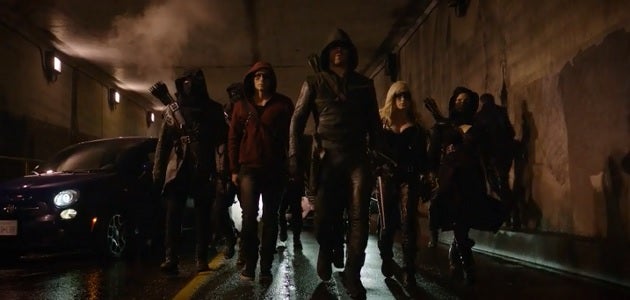It Takes A Cast To Tell An Epic
In an interview last week, Stephen Amell made a statement that really stuck with me.“I [...]

In an interview last week, Stephen Amell made a statement that really stuck with me.
"I personally love when there's adversity for the protagonist and we give other characters on the show the opportunity to … come more into leading roles," he said. "If we don't give other characters the opportunity to shoulder the load, then we give viewers nothing to attach them to. I'm excited for everyone's opportunity."
Amell's statement made two things abundantly clear:
1) He is the very definition of a class act. A talented actor, a consummate and gracious professional, Amell never misses an opportunity to praise and support his colleagues and show his appreciation to his fans.
2) Amell also understands a writing fundamental that sadly eludes too many writers. It takes a cast to tell an epic.
As a pro-novelist, I can quickly distinguish if a story is written by someone who is a master of their craft or if it's simply amateur hour.
One of the tells is character development, specifically the writer's approach to it. One the most infamous tropes in writing is building up a character, like say the protagonist, at the expense of another character. For example, cognitive dissonance prevents some writers from developing two strong well established characters in their respective rights. By writers' skewed logic, one character must be diminished for another character to thrive.
One of the many reasons why The Avengers and for that matter Captain America: The Winter Soldier resonated with fans was because every major protagonist got a moment to shine. Black Widow, Director Fury, Sharon Carter, Falcon, and Steve Rogers each got a scene where they bested a baddie at a climactic moment in the films.
The season 2 finale of Arrow is another example of this. With Starling City under siege by Deathstroke and his forces, Oliver realized he was outmatched and outgunned. Tensions hit a fever pitch and in the darkest moment, an unlikely cavalry of champions joined forces to aid Arrow: Nyssa and the League of Assassins, Canary, Laurel, Diggle, Arsenal, Waller and ARGUS. Even the series main big bad, Malcolm Merlyn, had a moment of heroism when he made a surprise return to save his daughter, Thea.
I would be remiss if I didn't mention the MVP of Team Arrow, Ms. Felicity Smoak. After all she single-handedly took down Deathstroke like the lady boss that she truly is.
This all goes back to a point Oliver made earlier this year. He started off as just one man and he never envisioned all these other people being part of that plan. He thought he would be a solo act. Part of what he experienced this year was seeing the crusade grow beyond him.
That's how great storytelling work. For that matter, life has a tendency to work that way as well.
0comments